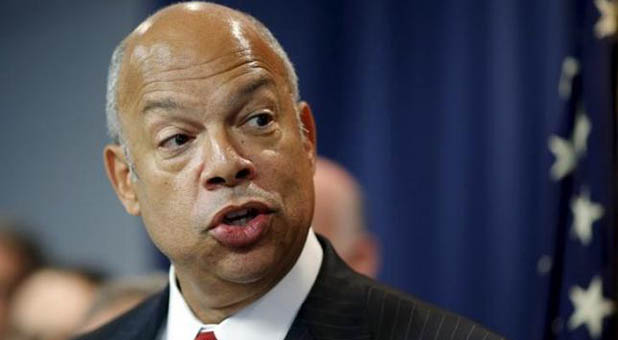Homeland Security Working to Ensure Integrity of Election
Since the DNCLeaks scandal, Republican presidential nominee Donald Trump has made the phrase “rigged political system” a key theme of his campaign.
It’s not entirely outside the realm of possibility that the election could be rigged—or hacked—to ensure a specific result. And that was the subject of a recent conference call between U.S. Secretary of Homeland Security Jeh Johnson and elections officials from all 50 states.
The department released the following statement about the phone call:
Today, Secretary of Homeland Security Jeh Johnson hosted a phone call with members of the National Association of Secretaries of State (NASS) and other Chief Election Officials to discuss the cybersecurity of the election infrastructure. It is critically important to continue to work to ensure the security and resilience of our electoral infrastructure, particularly as the risk environment evolves. Representatives from the U.S. Election Assistance Commission, the Department of Commerce’s National Institute for Standards and Technology (NIST), and the Department of Justice (DOJ) also participated in the call.
During today’s call, Secretary Johnson offered assistance in helping state officials manage risks to voting systems in each state’s jurisdiction. While DHS is not aware of any specific or credible cybersecurity threats relating to the upcoming general election systems, Secretary Johnson reiterated that DHS, the Election Assistance Commission, NIST, and DOJ are available to offer support and assistance in protecting against cyber attacks. He also recognized the important work already being done in the states to ensure the integrity and security of the nation’s elections. Secretary Johnson further emphasized that DHS is exploring all ways to deliver more support to the sector in a collaborative and non-prescriptive manner, and would be examining whether designating certain electoral systems as critical infrastructure would be an effective way to offer this support.
As part of the ongoing effort, the Secretary also announced that DHS is convening a Voting Infrastructure Cybersecurity Action Campaign with experts from all levels of government and the private sector to raise awareness of cybersecurity risks potentially affecting voting infrastructure and promote the security and resilience of the electoral process. Representatives of the National Association of Secretaries of State were invited to join this group to provide their expertise and input.
Secretary Johnson encouraged state officials to focus on implementing existing recommendations from NIST and the EAC on securing election infrastructure, such as ensuring that electronic voting machines are not connected to the internet while voting is taking place.
Secretary Johnson offered the assistance of the Department’s National Cybersecurity and Communications Integration Center (NCCIC) to conduct vulnerability scans, provide actionable information and access to other tools and resources for improving cybersecurity.
But Trump’s concerns were actually related to voter fraud, not hacking. In an interview with Reuters earlier this month, he highlighted those concerns:
“I mean people are going to walk in, they’re going to vote 10 times maybe. Who knows? They’re going to vote 10 times. So I am very concerned, and I hope the Republicans are going to be very watchful.”
It was reported Wednesday morning that Trump’s opponent, former Secretary of State Hillary Clinton, has hired a George Soros-backed illegal to run her campaign’s voter outreach to Latino voters. And the “rigged” primary that denied U.S. Sen. Bernie Sanders (I-Vt.) the Democratic presidential nomination is still sitting firmly in the minds of many.
Outspoken Trump supporter Roger Stone went so far Wednesday as to pen an op-ed for The Hill in which he explains “how” the Clinton campaign will “rig the election”:
In Europe, they use exit polling to determine who won and lost. The tabulated vote only serves as a formal verification. But that is done with paper ballots and hand counts under supervision, the way we used to do it.
Here’s the recipe now:
(1) Publish a poll contrived to suggest the result you are going to bring about.
(2) Manipulate the machines to bring about precisely your desired outcome.
As someone with great sentimental attachment to the Republican Party, as I joined as the party of Goldwater, both parties have engaged in voting machine manipulation. Nowhere in the country has this been more true than Wisconsin, where there are strong indications that Scott Walker and the Reince Priebus machine rigged as many as five elections including the defeat of a Walker recall election.
Of course, President Barack Obama and Democrats have called such charges “ridiculous.” But Johnson’s call with state officials would seem to suggest there’s at least some reason to be cautious.















































